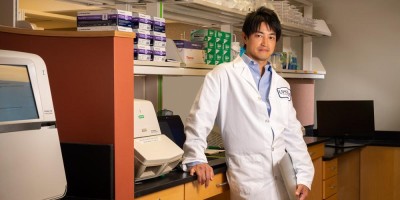Unraveling the Link Between Obesity and Chronic Wounds– Upstate Researcher Awarded $600,000 Grant to Investigate Neutrophils' Role and Pave the Way for Future Treatments
Norifumi Urao, MD/PhD, was just awarded over $600,000 from the National Institute of General Medical Sciences to better understand how obesity is connected to chronic wounds, a painful and costly condition that affects between 2-4 million people in the US alone. Urao thinks studying a type of white blood cell that shows evidence of being impacted by obesity can not only lead to a better understanding of the connection between obesity and wound healing but also point the way to future treatments. Urao is an assistant professor of Pharmacology, joining Upstate Medical University in 2019.

Norifumi Urao, MD/PhD, studies the mechanisms of tissue regeneration and wound healing at Upstate Medical University.
This research project aims to understand how chronic wounds are related to dysregulated white blood cells, called neutrophils. Chronic wounds, which are slow to heal, cost billions of dollars annually to treat.
“A chronic wound is a very difficult situation,” explains Urao. “The immune cells are not promoting healing, but instead destroying more tissue. The question is, how can we encourage a good immune response in the patient? We hope the key is neutrophil-releasing factors.” The first step will be to study how neutrophils influence the production of immune cells in the bone marrow, which play a role in wound healing. They hypothesize that during their clearance, neutrophils release substances that promote a pro-healing response.
Once they have a better understanding of neutrophil’s impact on wound healing, they will investigate why neutrophils' clearance and release of pro-healing substances is inhibited in chronic wounds for patients with obesity. Urao says preliminary data suggests the metabolic pathway is changed by the condition.
“We found that in obesity, the neutrophil doesn’t die properly,” he says. “When neutrophil dies, they release what’s called extracellular vesicles that control how the immune cells are produced."
A better understanding of this cycle can help researchers develop treatments for those suffering from chronic wounds. “Our hope is that by tweaking the neutrophil, we can normalize and reduce the chronic inflammatory state.”
Additionally, the study might pave the way for tests that monitor the survival of blood neutrophils, helping doctors choose better treatment options for patients with chronic wounds and obesity. Ultimately, the project aims to alleviate the economic and health burdens associated with chronic wounds and obesity, improving the quality of life for affected patients.
Urao is collaborating with multiple Upstate researchers to better understand the role neutrophils play in chronic wound healing, working with Juntao Luo, PhD who co-directors the Sepsis Interdisciplinary Research Center (SIRC), Ruth Weinstock, MD/PhD, the director of the Clinical Research Unit, Ramsay-Sami Farah, MD in the Department of Medicine and Joyce Farah, MD in Dermatology. Urao’s lab will receive support from BioSpherix, a company in Perish, NY that provides an oxygen-controlled chamber, to study cells in a physiologic environment.
You can read more about Urao’s laboratory and research here-
https://uraolab.wixsite.com/website